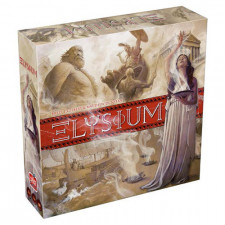Elysium Review
on Aug 5, 2015
Elysium has the promises and trappings of a compelling game, but it studiously works to avoid its most interesting aspects. I can see where the fun part of this game might be, but Elysium wants me to pay attention and buckle down instead of playing. I’m left with the feeling of a child who is stuck inside practicing the violin for hours, while his friends play outside in the sun.
The players each take on the role of a demigod who wants to make it into the pantheon of Mount Olympus. This is done by calling on the favor of five different gods. During setup the deck is constructed from five different smaller decks (the game comes with eight), each one corresponding to one of the gods. Each round the players get four turns each to buy three cards, as well as one turn order marker that will grant more abilities. These cards all have different powers themselves, giving the player various combinations of points, income, and other game effects. After all the purchases are made, players are given the opportunity to shift cards from the top of their player board to the bottom. Card effects happen when they are in the players’ domains on top, but they will only be worth points when they are transferred down to the players’ Elysium. It is in the Elysium that players will “write legends,†or place their cards in larger sets that will be worth points at the end of the game, although cards in the Elysium lose their abilities (with some exceptions). After five rounds the highest score wins.
The way purchases are made is probably the most interesting mechanic. Each player has four colored pillars, and each card has a cost of one or two colors. To take a card, the player must have the necessary color still present on their player board. This is tricky because after every purchase the player must remove one pillar for the rest of the round, but this doesn’t need to be the one just used to purchase a card. This is such an interesting element, I hope I see it used in a better game someday. It forces some excruciating decisions. Do I wait to buy a specific card by saving my red pillar, even though there’s a possibility someone might snag what I need and leave me without a chair when the music stops? The other cool feature is the different decks centered around Greek gods that are used to set up the game. Most of them have some thematic connection, such as Hephaestus generating more gold, or Apollo allowing the players to see upcoming cards with an oracle.
But there are a couple of fatal flaws that sink the experience. By far the most frustrating aspect is a nagging sense of identity crisis. I had hoped that Elysium would be a game of card effects and combined powers. It certainly looks the part, since there is astonishing variation among the different gods and the cards themselves. However the design works hard to keep the game from ever getting too volatile. The point of the game is creating card sets in your Elysium, not to generate cool combos. The game is much more interested in forcing tough decisions through the purchasing mechanic than it is in creating synergies. That’s fine in theory, but in practice it pushes cards out of play very quickly as players move them into sets. The creation of card combos is further hampered by the sheer size of the deck. The players will almost never use more than half of the cards in the game, which keeps synergies from forming that might push the game into more exciting territory.
Fans of the game will point out that Elysium is not a card-combo game, but is actually a set collection game. I would agree, and I don’t think that’s really the problem. The problem is that while the game refuses to embrace the combos and volatility of card effects, it still manages to find the biggest disadvantages of the genre. There is a lot of card text to internalize here, especially with four players. It’s a short enough game that it doesn’t overstay its welcome even when players go slowly, but it does make the game seem very opaque. It’s just hard to see what actually works in the game. There’s a lot of strategic overhead required to get to some kind of payoff, making Elysium feel like the most complicated set collection game ever.
So we have a game that appears to give you all of these great options, but constricts what you can actually do with them to such an extent that it chokes the life out of it. It is more worried about being strategic than it is about being interesting. That might end up being interesting in and of itself for some people, but it still feels like it was designed to avoid big long action chains like those found in Dominion, or unbeatable engines like those in Race for the Galaxy. No doubt some people will find a way to generate those things with enough experience, but it hardly seems worth the trouble.
It’s a shame too, because they buying mechanic is really interesting. I also like some of the mythological flavor put into the cards, though the overall design does a poor job of integrating its Greek setting. But the game is just too constricting. There’s all this promise of fun strategic possibilities, but it’s much more about mastering process than anything else. Not only that, but it forces the player to internalize a lot of different cards to play well, essentially giving it the disadvantages of card effect games without much of the upside. It’s like the game is afraid of how exciting it could be.

 Customer Support
Customer Support  Subscribe
Subscribe 




 Account
Account  Wishlist
Wishlist 

